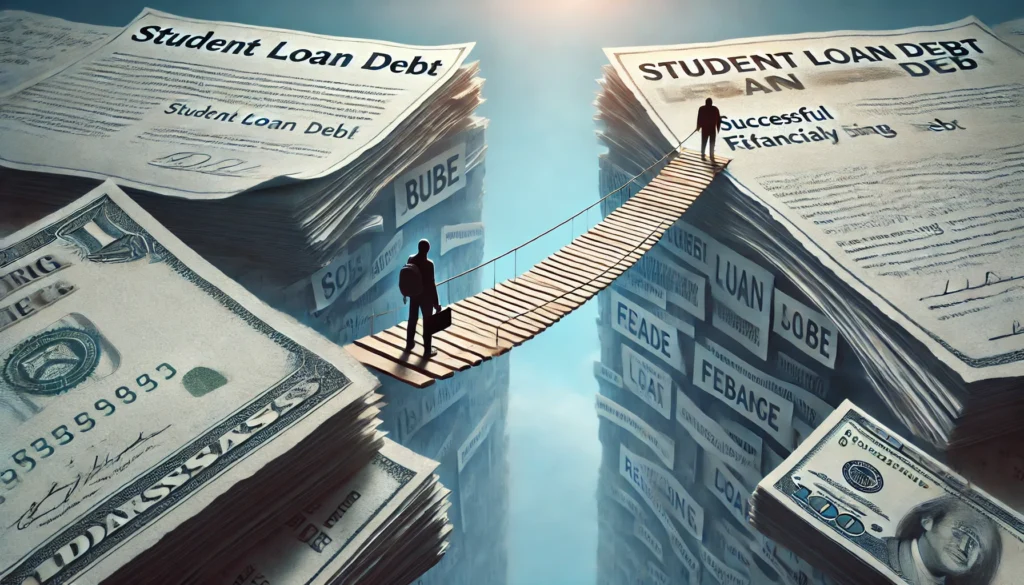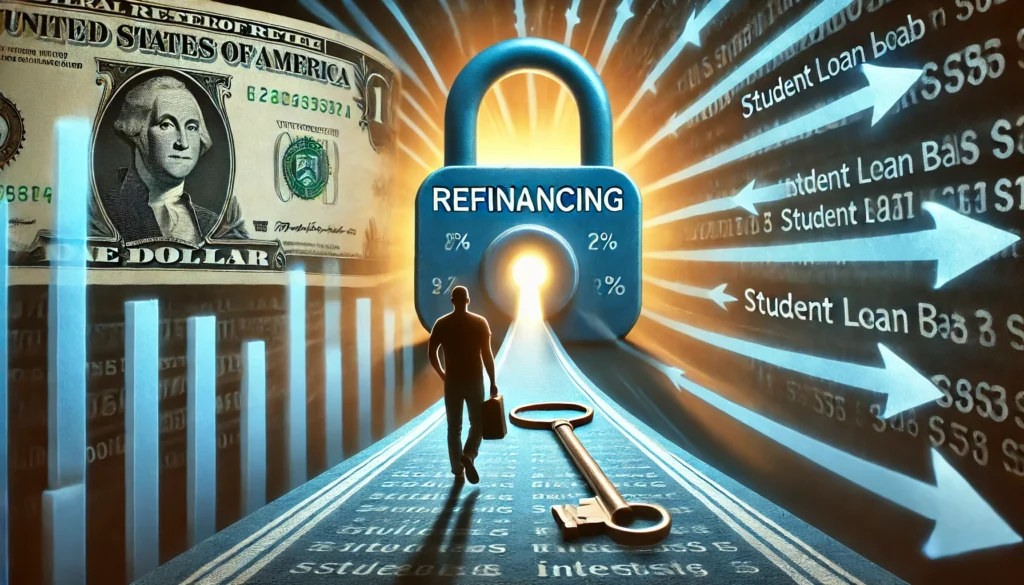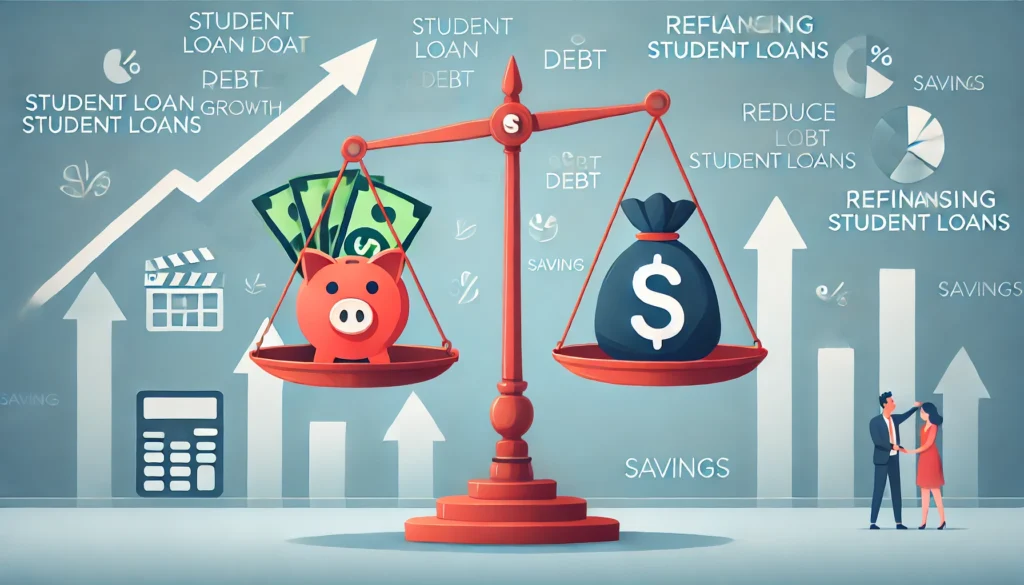Understanding Student Loan Refinancing: A Path to Financial Freedom
For millions of borrowers, student loans represent a significant financial obligation that can take years, even decades, to repay. Many graduates find themselves burdened by high-interest rates, long repayment terms, and monthly payments that stretch their budgets. Understanding how can you refinance student loans is a crucial step toward managing debt more efficiently and potentially saving thousands of dollars over time. Refinancing involves replacing existing student loans with a new loan, ideally at a lower interest rate and with better repayment terms. While this strategy can provide financial relief, it is essential to understand the benefits, risks, and eligibility requirements before making a decision.
You may also like: Best Student Loan Refinance Options in 2025: Compare Rates & Save Thousands
Refinancing can be particularly beneficial for borrowers with high-interest private student loans, but it can also be an option for those with federal loans under certain circumstances. However, the process is not one-size-fits-all, and there are key factors to consider, such as creditworthiness, income stability, and long-term financial goals. Additionally, refinancing a federal student loan comes with trade-offs, including the loss of federal benefits such as income-driven repayment plans and loan forgiveness programs. Borrowers must weigh these factors carefully to determine whether refinancing aligns with their financial situation and future plans.

Can Student Loan Debts Be Refinanced? Evaluating Your Options
A common question among borrowers is, “Can student loan debts be refinanced?” The answer is yes, but eligibility and benefits vary depending on the type of loans held and the borrower’s financial profile. Both federal and private student loans can be refinanced through private lenders, but the process and potential savings depend on several key factors, including credit score, income, and loan balance.
For private student loan borrowers, refinancing can offer immediate relief by securing a lower interest rate, which can reduce monthly payments and the total cost of the loan over time. This is particularly advantageous for individuals with strong credit histories and stable income sources. Private lenders evaluate borrowers based on creditworthiness, meaning those with high credit scores and steady employment are more likely to qualify for favorable terms.
On the other hand, federal student loans come with unique benefits such as income-driven repayment plans, deferment, forbearance, and potential loan forgiveness programs. Refinancing federal loans with a private lender means forfeiting these protections, making it a less attractive option for those who may need flexibility in repayment. Borrowers considering refinancing a federal student loan must assess whether the lower interest rate and potential cost savings outweigh the loss of federal protections and benefits.
The Benefits of Refinancing Student Loans
Refinancing student loans can offer numerous advantages, particularly for borrowers with high-interest debt. By securing a lower interest rate, borrowers can reduce the total amount paid over the life of the loan and potentially shorten the repayment term. This can lead to substantial savings and allow for a faster path to financial freedom.
A significant advantage of refinancing is the potential for lower monthly payments, which can free up cash for other financial goals such as saving for a home, investing for retirement, or paying off other debts. Additionally, refinancing allows borrowers to consolidate multiple loans into a single payment, simplifying repayment and reducing administrative hassles.
Another key benefit is the ability to choose new repayment terms that align with personal financial goals. Borrowers can opt for shorter terms to pay off debt faster and save on interest or extend terms to reduce monthly payments. Lenders also offer fixed and variable interest rate options, providing flexibility based on risk tolerance and financial stability.
While refinancing can offer significant advantages, it is crucial to evaluate whether it aligns with long-term financial goals. Borrowers should assess potential savings, repayment flexibility, and the impact on overall financial stability before committing to a refinancing decision.
Can You Refinance Private Student Loans? Understanding the Process
Many borrowers wonder, “Can you refinance private student loans?” The good news is that private student loans are among the easiest to refinance, as they do not come with federal protections that would be forfeited in the process. Private lenders offer refinancing options based on creditworthiness, income, and other financial factors, making it possible to secure a lower interest rate and better repayment terms.
The refinancing process for private student loans typically involves applying through a private lender, undergoing a credit check, and submitting proof of income and employment. Lenders assess the borrower’s ability to repay the new loan and determine interest rates accordingly. Those with strong credit scores, stable employment, and a solid debt-to-income ratio are more likely to qualify for the lowest rates.
One of the biggest advantages of refinancing private student loans is the potential for cost savings. By lowering the interest rate, borrowers can reduce the total amount paid over time, freeing up funds for other financial priorities. Additionally, refinancing can allow borrowers to switch from a variable to a fixed interest rate, providing greater predictability in payments.
However, borrowers should carefully evaluate lender terms, fees, and repayment flexibility before refinancing. Some lenders offer benefits such as deferment or forbearance options, while others may have stricter repayment requirements. Understanding the full terms of the refinanced loan is essential to making an informed decision.
Does It Cost Money to Refinance Student Loans? Evaluating Fees and Costs
A crucial consideration when refinancing student loans is whether it incurs additional costs. Many borrowers ask, “Does it cost money to refinance student loans?” The answer depends on the lender, as some refinancing options come with fees, while others do not.
Most reputable lenders do not charge application fees or prepayment penalties, making it possible to refinance without incurring upfront costs. However, some lenders impose origination fees, which can range from 1% to 5% of the loan balance. While these fees may seem small, they can add up and impact overall savings.
Borrowers should also consider potential costs associated with losing federal loan benefits. For example, refinancing federal loans with a private lender eliminates access to income-driven repayment plans and loan forgiveness programs, which may be valuable for those in public service careers or facing financial hardship.
To determine whether refinancing is a cost-effective option, borrowers should compare interest rates, loan terms, and potential fees from multiple lenders. Utilizing online calculators can help assess potential savings and identify the most beneficial refinancing option.

Frequently Asked Questions (FAQ) on Student Loan Refinancing
1. How can you refinance student loans to get the best interest rate?
Refinancing student loans successfully requires thorough research and an understanding of how lenders evaluate borrowers. Your credit score, income stability, and debt-to-income ratio play significant roles in securing the lowest possible interest rate. Shopping around and comparing offers from multiple lenders can help you identify the best deal, as each lender has different underwriting criteria. Additionally, consider applying with a creditworthy co-signer if your credit profile is not strong enough to qualify for the most competitive rates. Lastly, improving your financial habits—such as making timely payments and reducing other outstanding debts—can further enhance your chances of securing favorable refinancing terms.
2. Can student loan debts be refinanced multiple times, and is it beneficial?
Yes, student loan debts can be refinanced multiple times, and in certain circumstances, it can be highly beneficial. Refinancing repeatedly can help borrowers take advantage of changing market conditions, such as lower interest rates or improved credit scores that qualify them for better terms. However, frequent refinancing should be approached cautiously, as each refinance may reset repayment terms, extend your loan duration, and potentially increase overall interest costs. Some lenders also have restrictions on how often you can refinance, so it’s important to evaluate the long-term financial impact before proceeding. Weighing the savings on interest against potential fees and lost borrower benefits from federal loans is essential in making an informed decision.
3. What should you consider before refinancing a federal student loan?
Refinancing a federal student loan into a private loan means giving up certain federal protections and benefits, so careful consideration is necessary. Federal student loans offer borrower benefits such as income-driven repayment plans, deferment, and forbearance options, which are not available with most private lenders. Before refinancing, assess whether you might need these protections in the future, especially if your income fluctuates or you work in public service and could qualify for loan forgiveness programs. Additionally, consider the impact of variable versus fixed interest rates when choosing a refinancing option. If you have stable income and a strong credit profile, refinancing could lower your monthly payments and total interest costs significantly.
4. Can you refinance private student loans with different lenders, and is it advisable?
Yes, private student loans can be refinanced with different lenders, and it can be a strategic financial move. Different lenders offer varying interest rates, repayment terms, and borrower benefits, so shopping around can help you find more favorable terms. If your financial situation has improved since taking out your original loan—such as an increased credit score or higher income—you might qualify for significantly lower rates. However, it’s crucial to read the fine print on any new loan agreement, as some lenders may include prepayment penalties or hidden fees. Always weigh the benefits of refinancing against any potential costs to determine whether switching lenders makes sense for you.
5. Does it cost money to refinance student loans, and how can you avoid unnecessary fees?
Refinancing student loans does not always come with direct costs, but there are potential fees to be aware of. Some lenders charge origination fees, application fees, or prepayment penalties, which can add to the cost of refinancing. To avoid unnecessary expenses, look for lenders that offer no-fee refinancing options and carefully review loan agreements for hidden costs. Additionally, while a lower interest rate may seem appealing, extending the loan term can increase the total amount of interest paid over time. Understanding the full cost-benefit analysis will help ensure that refinancing truly saves you money in the long run.
6. How does refinancing student loans impact your credit score?
Refinancing student loans can affect your credit score both positively and negatively, depending on how you manage the process. When you apply for refinancing, lenders typically conduct a hard credit inquiry, which may temporarily lower your score. However, if you successfully refinance to a lower interest rate and make on-time payments, your credit score can improve over time. Closing old loan accounts and opening new ones may slightly impact your credit history length, but consistent repayment behavior carries more weight. To minimize any negative effects, avoid applying for multiple credit products at once and maintain a strong credit utilization ratio.
7. What are the risks associated with refinancing a federal student loan into a private loan?
Refinancing a federal student loan into a private loan comes with risks that borrowers should carefully consider. The most significant downside is losing federal protections such as income-driven repayment plans, deferment options, and Public Service Loan Forgiveness eligibility. If you experience financial hardship after refinancing, private lenders may not offer as many flexible repayment options as federal loans. Additionally, private loans often come with varying interest rates, which can make long-term planning more challenging. Borrowers should only refinance federal loans if they are confident in their financial stability and do not require federal benefits in the future.
8. How can refinancing student loans affect your monthly payments and overall repayment period?
Refinancing student loans can significantly alter your monthly payments and the total length of your repayment period, depending on the terms you select. If you refinance to a lower interest rate while keeping the same repayment term, you’ll likely see a reduction in your monthly payment. Conversely, choosing a longer repayment term can lower your monthly payment but increase the total interest paid over time. On the other hand, a shorter repayment term can help you save on interest but may require higher monthly payments. Understanding how these trade-offs impact your long-term financial goals is key to making the best refinancing decision.
9. Are there any hidden disadvantages to refinancing student loans?
While refinancing student loans can offer financial benefits, there are some hidden disadvantages to be aware of. Some lenders may require a co-signer, which can create financial liability for another person if you’re unable to make payments. Additionally, refinancing federal loans means losing access to government forgiveness programs and flexible repayment options. If you refinance with a variable interest rate, your monthly payments may fluctuate over time, potentially increasing your financial burden. Carefully reviewing the loan terms and considering potential future financial changes will help you make an informed decision.
10. How often should you reassess your refinancing options?
It’s a good idea to reassess your refinancing options periodically, especially if interest rates have dropped or your financial situation has improved. Monitoring the market for better interest rates can help you take advantage of potential savings. However, refinancing too frequently can lead to excessive hard credit inquiries and extend your repayment timeline unnecessarily. Before refinancing again, evaluate the total cost savings and consider whether it aligns with your long-term financial goals. Making refinancing decisions strategically rather than impulsively will help you maximize benefits while minimizing potential downsides.

Final Thoughts: Making an Informed Decision on Student Loan Refinancing
Refinancing student loans can be a powerful tool for managing debt and achieving financial freedom. By securing lower interest rates, reducing monthly payments, and simplifying repayment, borrowers can take control of their financial future. However, it is essential to carefully evaluate the benefits, risks, and potential costs associated with refinancing.
Before making a decision, borrowers should assess their financial goals, creditworthiness, and loan terms. Comparing offers from multiple lenders and understanding the implications of refinancing federal versus private loans are crucial steps in the process. Ultimately, refinancing should align with long-term financial objectives, providing both immediate relief and future savings.
Tags
student loan refinancing tips, lower student loan payments, student loan debt relief, best student loan refinancing companies, federal vs private student loans, student loan repayment strategies, interest rates on student loans, student loan debt solutions, managing student loan debt, refinance student loans with bad credit, private student loan refinancing options, student loan debt management, best ways to pay off student loans, refinancing student loans pros and cons, lowering student loan interest rates, best banks for student loan refinancing, financial planning for student loan repayment, saving money on student loans, refinancing college debt, debt management strategies for graduates
Further Reading:
Beginner’s Guide to Refinancing Your Student Loans
Should You Refinance Your Student Loans?
The basics of refinancing a student loan as a parent
Legal Disclaimer
The information provided in this article is for general informational purposes only and is not intended to constitute financial, investment, legal, tax, or other professional advice. The content should not be relied upon for making any financial or investment decisions. Readers are encouraged to consult with licensed professionals, such as financial advisors, attorneys, or tax experts, to obtain personalized advice tailored to their individual circumstances. The author and publisher disclaim any liability for any actions taken or not taken based on the information provided in this article.





